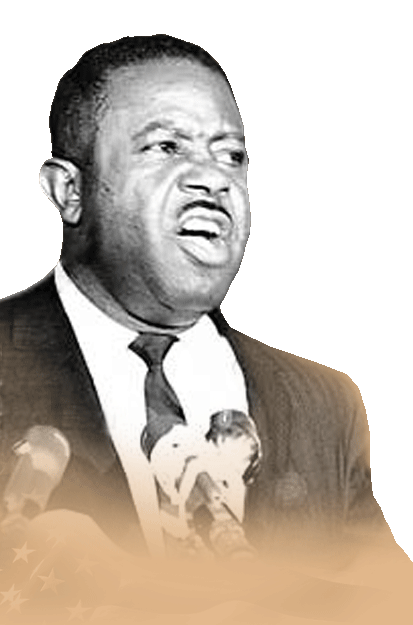 |
 |
 |
 |


| ||||||
|
Rev. Abernathy won praise as a strong mediator in the Civil Rights Movement. He encouraged his friend Rev. Martin Luther King, Jr. to join Montgomery, Alabama's black community in protesting the arrest of Rosa Parks in December 1955. Parks had defied segregation laws by refusing to give up her bus seat to a white man. Soon Abernathy and King emerged as leaders of the successful 381-day Montgomery Bus Boycott, which forced the integration of the city's public transportation. That landmark victory catapulted the two men to the forefront of the national Civil Rights Movement. Abernathy worked with King and others to establish the Southern Christian Leadership Conference (SCLC) in 1957. That organization galvanized and supported nonviolent protests springing up primarily throughout the South. Abernathy served as the SCLC secretary-treasurer (1957-1968). In 1963 he became one of four black ministers sued for endorsing a New York Times ad criticizing Alabama police. In the landmark New York Times v. Sullivan decision, the Supreme Court reversed the guilty verdict, thus, limiting public officials' right to seek damages from critics. After the assassination of King, Abernathy became SCLC's second president (1968-1977). He directed plans for the Poor People's March on Washington and the Atlanta sanitation workers' strike in 1968. In 1969, he helped lead the Charleston, South Carolina hospital workers' strike. Born into a respected farm family, Abernathy did not experience overt racism until he joined the segregated Army during World War II. After the war, he attended Alabama State University, entered the ministry, and earned a Master's degree from Atlanta University. He became pastor of the prestigious First Baptist Church in Montgomery in 1950. Two years later, he married schoolteacher Juanita Odessa Jones. The couple raised three children while working on the front lines of the Civil Rights Movement. Abernathy survived numerous beatings, nineteen arrests and jail time for his activism. As pastor of West Hunter Street Baptist Church in Atlanta (1961-1990), he continued his activism until his death at the age of 64. His autobiography, And the Walls Came Tumbling Down, was published in 1989. Ralph David Abernathy Boulevard in southwest Atlanta is named in his honor. |